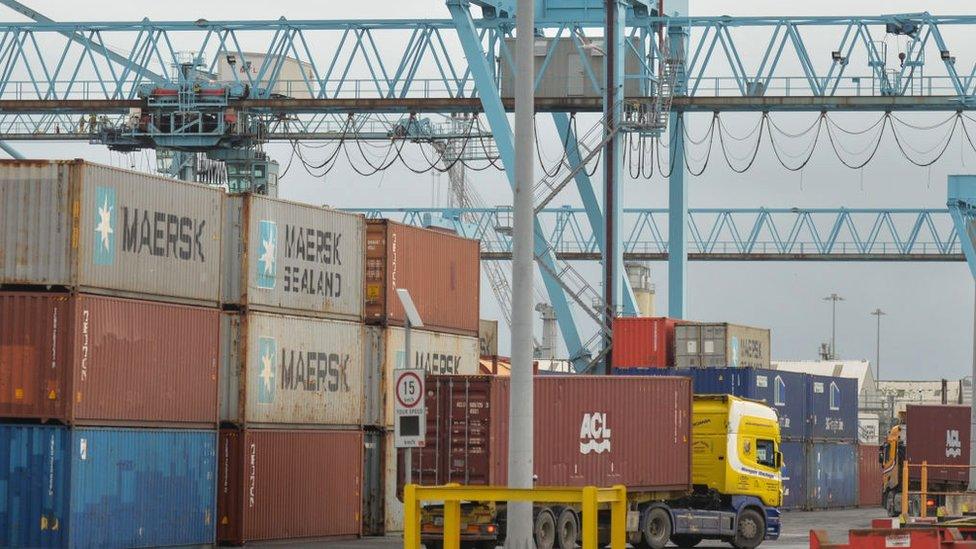Scotland lost industry investments over freeports deal, says mayor
- Published

Freeports allow firms to import goods and then re-export them outside normal tax and customs rules
Scotland has lost at least three industrial investments because ministers did not agree to a UK government tax policy, it is claimed.
Conservative mayor Ben Houchen said companies abandoned plans to locate in Scotland as the two governments did not reach a freeports deal.
These enterprise zones offer a number of savings to businesses including tax breaks on investment.
The Scottish government said it was committed to its "green port" approach.
'Abandoned Scotland'
Speaking on The Sunday Show on BBC Radio Scotland, Mr Houchen, the mayor of Tees Valley, said he believed Scotland was "missing a trick".
He said: "We have attracted investors who were originally looking at Scotland when some areas in Scotland were looking at freeport status, and when they decided not to move forward with the current UK freeport policy (they) have actually abandoned Scotland.
"At least three investors who are, in the next six months, publicly going to announce in Teesside, would have gone to Scotland.

Ben Houchen said companies abandoned plans to locate in Scotland
"The fundamental issue is the cost of capital, and the lower barrier for investment in Teesside as a result of the freeport was the reason that they have moved away from Scotland as the place to invest.
"In all honesty, the longer you're not at the table, the less likely you are to get investment, and that would be a great shame."
He added: "I'm an advocate for Teesside, but this is a policy that could benefit large parts of the UK".
As well as tax breaks on investment, freeports offer waivers on business rates and National Insurance Contributions, lower land transactions tax and fast-track planning, as well as tariff-free imports of materials and export of manufactured goods.
They are a flagship policy of the UK government's strategy for "levelling up" poorer parts of England after leaving the European Union. Eight areas have been designated freeports, with Teesside one of the earliest to open, in October.
The Scottish government was willing to go along with the UK policy, on condition that it was called a "greenport" and focused only on low-carbon industry, while having a guarantee that jobs in the zones would be on at least the real living wage. That is higher than the statutory minimum wage.
The names of the companies that chose not to locate in Scotland are not being released, and may not become public, as companies rarely talk about the locations they consider and then reject.
'Next steps'
In July, the Scottish government named nine areas that were being considered for greenport status: Shetland, Orkney, Aberdeen with Peterhead, Montrose, Dundee, a consortium of ports and industrial sites around the Firth of Forth, a similar consortium in the Glasgow City Region, and Cairnryan near Stranraer.
That was before the breakdown in talks on the plans between UK and Scottish ministers. Since then, in October, both sides said they were preparing separate plans for low-tax enterprise zones.
The Scottish government, along with local councils, controls business rates, land and buildings transaction tax, transport, planning and skills training.
The UK government can offer customs waivers and tariff exemptions, reductions in National Insurance Contributions, and tax breaks on investment. Neither side can alone offer all of the package available to investors in English freeports.
A Scottish government spokesperson said: "We remain committed to implementing our green port approach in Scotland, and will be communicating next steps in the very near future."
It is understood that a new approach has been made recently to get the Scottish and UK governments to work together on the scheme.
- Published19 December 2021
- Published3 July 2021
